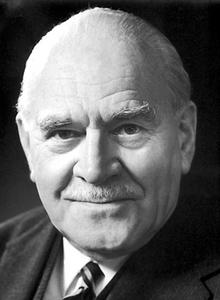Ronald George Wreyford Norrish facts for kids
Quick facts for kids
Ronald George Wreyford Norrish
|
|
|---|---|
 |
|
| Born | 9 November 1897 Cambridge, England
|
| Died | 7 June 1978 (aged 80) Cambridge, England
|
| Alma mater | University of Cambridge (BA, PhD) |
| Known for | Flash photolysis Norrish reaction Trommsdorff–Norrish effect |
| Awards |
|
| Scientific career | |
| Fields | Chemistry |
| Institutions | University of Cambridge |
| Thesis | Radiation and chemical reactivity (1924) |
| Doctoral advisor | Eric Rideal |
Ronald George Wreyford Norrish was a British chemist. He won the Nobel Prize in Chemistry in 1967. He was known for his work on very fast chemical reactions.
Early Life and Learning
Ronald Norrish was born in Cambridge, England, on November 9, 1897. From a young age, he loved chemistry. He would often walk around the chemistry labs at Cambridge University. He admired all the cool equipment there.
His father helped him set up a small lab. It was in a shed in their garden. His father even gave him all the chemicals he needed for experiments. Ronald used to enter competitions. He would analyze different mixtures and often won prizes!
In 1915, Ronald won a scholarship to Emmanuel College, Cambridge. But he decided to join the army instead. He served as a Lieutenant in the Royal Field Artillery. He fought in World War I on the Western Front.
War and Return to Science
During World War I, Ronald Norrish became a prisoner of war. He was captured in March 1918. He later shared his sadness that many of his friends from Cambridge did not survive the war.
After the war, Norrish returned to Emmanuel College in 1925. He became a Research Fellow. Later, he became the head of the Physical Chemistry Department at the University of Cambridge. He was a very talented scientist.
He was especially good at doing experiments in the lab. This helped him make big discoveries. He studied how light affects chemical reactions. He also looked at how gases react.
Amazing Discoveries and Awards
Ronald Norrish was elected a Fellow of the Royal Society in 1936. This is a very important honor for scientists.
He helped develop a special method called flash photolysis. This method lets scientists study extremely fast chemical reactions. Imagine trying to see something happen in a tiny fraction of a second! Flash photolysis made this possible.
Because of this important work, Norrish won the Nobel Prize in Chemistry in 1967. He shared the prize with two other scientists, Manfred Eigen and George Porter. He also developed something called the Norrish reaction.
Ronald Norrish also supervised Rosalind Franklin at Cambridge. She later became famous for her work on DNA.
See also
 In Spanish: Ronald George Wreyford Norrish para niños
In Spanish: Ronald George Wreyford Norrish para niños
 | James Van Der Zee |
 | Alma Thomas |
 | Ellis Wilson |
 | Margaret Taylor-Burroughs |

